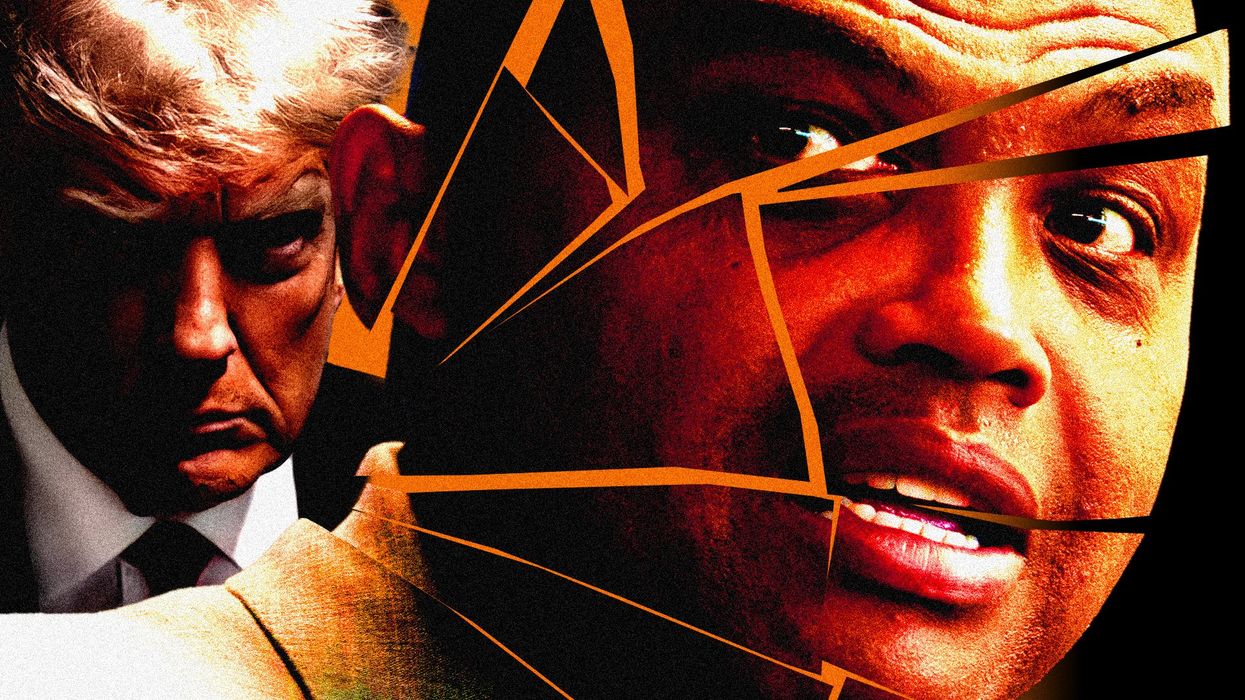
Mitchell Leff / Contributor | Getty Images

Barkley was Trump before Trump broke him.
Donald Trump broke Charles Barkley, the Hall of Fame basketball player turned Hall of Fame broadcaster.
The most outspoken, entertaining, and politically incorrect athlete since Muhammad Ali has been transformed into a toe-the-line black gatekeeper for the secular, globalist elites who control the purse strings. Sir Charles is more likely to share his pronouns in support of the Alphabet Mafia than state anything that ruffles the sensibilities of Trump-haters.
This week, sitting alongside fellow black gatekeeper Gayle King, Barkley threatened to beat up any black person he spotted wearing a T-shirt with Trump’s mug shot.
Like all good gatekeepers, Barkley thinks black people have cornered the market on victimhood. It’s an unsophisticated worldview. But it’s a pervasive one throughout modern American culture.
Barkley is arguing that Donald Trump cannot experience unfairness because he’s rich and has been elected president.
Let’s provide a little context. During a stump speech, Trump bragged that black voters found him relatable and likeable because the criminal justice system was being used unfairly to punish him. Many black pundits have pretended that Trump committed a great racial offense analogizing himself to black people. As far as I know, Sir Charles is the lone pundit to threaten violence over it.
“If I was at that [rally], I would have gotten up and walked out,” Barkley went on. “That was an insult to all black people. … It’s not a fair comparison. He’s a billionaire. He’s had a great life. He’s been president of the United States. To insult black people who have been discriminated against all these years, to put them in the same category, I was just offended.”
Trump casting himself as a victim is worth fighting over in the minds of American black people who have adopted victimhood as a unique and important identity. Trump has committed a form of cultural appropriation or identity theft.
Victimhood is our hustle. It’s how we demand power and justify special treatment. We frame any and every unfairness we experience as an outgrowth of “discrimination.”
If the Bloods or Crips kill your cousin, it’s a byproduct of the slavery some of our ancestors experienced 160 years ago. If a white man kills your cousin, you can petition the courts to seek racial-enhancement penalties. Your dead cousin’s legacy will be determined by the race of the killer.
Murder is a form of unfairness. We’ve made “discrimination” the gold standard of unfairness. It’s dishonest, divisive, and counterproductive.
I’m not sure if Barkley actually believes what he’s saying. It’s certainly illogical.
Barkley is arguing that Donald Trump cannot experience unfairness because he’s rich and has been elected president. OK. Explain John Kennedy. Was President Kennedy treated unfairly on November 22, 1963? Kennedy’s father was one of the richest men in America.
Unfairness has no color. It can and does attack anyone.
Barkley could argue that Trump isn’t being treated unfairly. Fine. There are people, including me, who don’t believe George Floyd was treated unfairly on May 25, 2020.
It’s all just an opinion. Everyone has one.
Trump and his supporters believe he is being unfairly targeted by his political opponents. That belief is shared by a growing number of black people. Barkley wants to threaten violence against those black people. They are not allowed to think whatever they want. They must adopt Barkley’s point of view on Trump.
Barkley is a gatekeeper, an overseer of the minds of black people.
Why? What changed?
In 2015, while serving as an editor at ESPN, I oversaw and edited a major profile story on Barkley written by Jesse Washington. The piece explained Barkley’s habitually nonconformist opinions on race and America. The first section of the profile analyzed and discussed Barkley’s MLK Day comments on the set of TNT’s NBA studio show from that year.
“For myself, being from Alabama, civil rights means a big deal to me,” Barkley said. “And my grandmother, who’s the greatest person who’s ever been in my life, always said to me, there’s a lot of people did heavy lifting to make you become successful. And the one thing you don’t want to do is screw it up.
“One problem we have in the black community: There’s a lot of self-inflicted wounds. You can’t do that.”
That was stereotypical Charles Barkley before the 2016 Trump presidency. The profile story argued that Barkley’s worldview had been shaped by the legacy of Booker T. Washington, the late 1800s and early 1900s black American educator and author who founded Tuskegee University in Alabama. Washington’s autobiography, “Up from Slavery” inspired the title of the profile story written on Barkley: “Up from Leeds.”
Barkley grew up in Leeds, Alabama. He went to college at Auburn. His worldview was heavily influenced by Washington.
Today, Barkley’s worldview is shaped by Trump derangement. I’d like to call it a self-inflicted wound, but I don’t think that’s accurate. Barkley is simply doing what he’s told. In order to protect his massive paycheck, Barkley abandoned the point of view that made him unique, must-see TV and relatable to working-class people of all colors.
Barkley was Trump before Trump broke him.
Jason Whitlock
BlazeTV Host